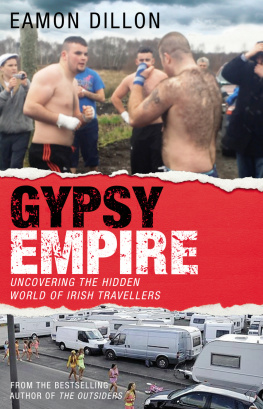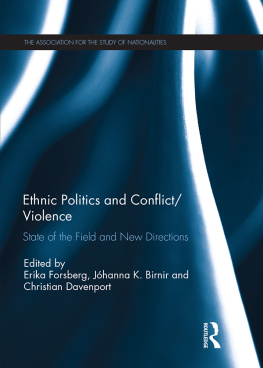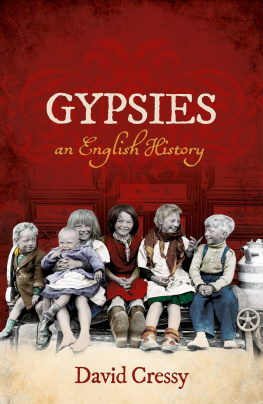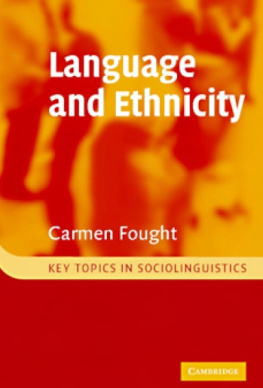Gypsy and Traveller Ethnicity
This book explores the notion of Gypsy and Traveller ethnicity, providing a much-needed critique of the conceptual basis of racial and ethnic categorisation of these groups. Using an analysis of the post-war housing situation to illustrate a connection between social and economic conditions, Brian Belton also examines legislation affecting Gypsies and Travellers.
Gypsy and Traveller Ethnicity argues that the position of Gypsies and Travellers largely arises out of social conditions and interaction rather than political, biological or ideological determinants. In a bold and entirely original manner Belton demonstrates how the ethnic Traveller is socially generated as a cultural, ethnic and racial categorization, this offers a rational explanation of the development of an itinerant population that is more informative than interpretations based on blood, ethnicity or race.
Brian A. Belton is Senior Lecturer at the YMCA George Williams College, London. His research focuses on the nature of culture, race and ethnicity, and oral history, particularly in relation to sport and community.
Gypsy and Traveller Ethnicity
The social generation of an ethnic phenomenon
Brian A. Belton
First published 2005 by Routledge
2 Park Square, Milton Park, Abingdon, Oxfordshire, OX14 4RN
Simultaneously published in the USA and Canada
by Routledge
270 Madison Ave, New York, NY 10016
Routledge is an imprint of the Taylor & Francis Group
This edition published in the Taylor & Francis e-Library, 2005.
To purchase your own copy of this or any of Taylor & Francis or Routledges collection of thousands of eBooks please go to www.eBookstore.tandf.co.uk.
2005 Brian A. Belton
All rights reserved. No part of this book may be reprinted or reproduced or utilised in any form or by any electronic, mechanical, or other means, now known or hereafter invented, including photocopying and recording, or in any information storage or retrieval system, without permission in writing from the publishers.
British Library Cataloguing in Publication Data
A catalogue record for this book is available from the British Library
Library of Congress Cataloging in Publication Data
A catalog record for this book has been requested
ISBN 0-203-32357-2 Master e-book ISBN
ISBN 0415348994 (Print Edition)
In memory of Jimmy Stone, the Bonny Downs Gypsy Boys and their sacrifice
Contents
Illustrations
Figures
Tables
Acknowledgements
This book has been written over a period of research that really has no beginning within the span of my life. I was born surrounded by the echoes of Gypsy culture and was brought up in constant contact with the complexities, joys and woes, the inescapable consequences of that association.
This being the case, these pages cannot house the necessary acknowledgements of a lifetime of interaction, bewilderment, learning, arguing, fighting, resisting, embracing, fostering, rejecting and understanding. As such this is a symbolic tribute but I hope I can mark the most fruitful associations that have helped me extract the pictures that follow from the realm of almostness. The most pragmatic collaborator in that process was Rosy, the mother of my son. She has been a tireless editor, bold consultant, honest critic and kind encourager. Other, more tangential contributors can be found in the pages of this book. From the people closest to me, to others I knew for only a few minutes. They populate and punctuate the analysis and, I hope, bring it to life. Family, friends and enemies. The living and the dead. Bastards and saints, lovers lost and found and, playing between the chapters, my (and Rosys) son, who has lived with this work the whole short time he has danced on this earth. I dedicate this book to him; a life busily making and remaking his identity. For him I hope the bonds of ethnicity will never define him, the corral of race never hold him or the exactitudes of culture, defined outside him, impede his progress in looking for himself, a search which at its best has no end. These, my wishes for Christian and all human kind, were the seed of the crop of words I now offer to you.
A priest once offered me peace amriya on that priest. I seek not peace but barearav, chachimos, darane svatura, chere and desrobireja. This is why I wander still.
Introduction
This book is an exploration of the social generation of the notion of Gypsy and Traveller ethnicity. Using quantitative and qualitative data, it seeks to problematize the conceptual basis of racial and ethnic categorization of this group and heighten the general awareness of the diversity and difference that exist within the Traveller population in the face of the conventional view of this group that, in short, effects an homogenization of Travellers into a distinct ethnic/cultural/racial grouping.
The work examines legislation that has had, and is likely to have, an impact on Gypsies and Travellers. This is linked to an analysis of the post-war housing situation in order to illustrate a connection between social and economic conditions, legislation affecting Gypsies and Travellers and the visibility and general consciousness of the Gypsy and Traveller population. The book argues that the position and categorization of Gypsies and Travellers largely arises out of social conditions and interaction that are attributable to the disciplinary social form, rather than discrete political or ideological determinants.
In the pages that follow I will demonstrate that Gypsy and Traveller identity is founded on a life-style that contradicts the discipline of the housing market. I will argue that itinerant ways of life are repressed by disciplinary society as they represent a symbolic threat to the order. I go on to critique individual emotional or moral explanations for the repression of travelling forms of existence and suggest that these are largely symptomatic of a more profound aetiology of repression, set in the social structure. The book puts forward the notion that itinerancy is the object of control as it is antithetical to the structure of contemporary society. A travelling life-style is considered as only a symbolic threat because as a phenomenon it provides an example of defiance of disciplinary society. Ambulant ways of life are not able to provide a mass alternative to the housing market. On this basis the book presents a critique of theories that portray discrimination against Travellers as arising out of psychological dispositions premised on race or ethnicity. The book puts forward a theoretical structure focusing on the social generation of Travellers as a cultural, ethnic and racial categorization over a broader tableau than has been previously attempted, whilst the analysis is focused on the situation pertaining to post-war Europe and some data generated in the United States and Australia, I believe that the position I establish in this work is applicable to a much wider constituency than the United Kingdom. Given its theoretical underpinnings it is likely that the analysis that follows provides a model for a broader understanding of the travelling population across western Europe, North America and the post-industrial world.
In what follows I explore ethnicity and the politics of culture relating to Gypsies and Travellers (centred as they are on the homogenization and categorization of the travelling population), including contemporary issues connected with discrimination and how this relates to forms of social exclusion, primarily in the form of housing provision. This amounts to an examination of space, place and location in the light of current issues facing Travellers as embodied, for example, in the Traveller Law Reform Bill 2002. In the process I will offer a rational explanation of the development of an itinerant population that is less ambiguous and more informative in terms of the social nature of the Gypsy and Traveller position than interpretations based on blood, breed, stock ethnicity or race that dominate the literature.










